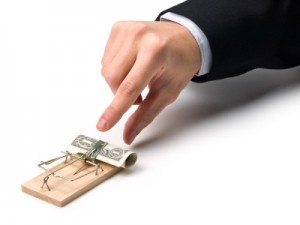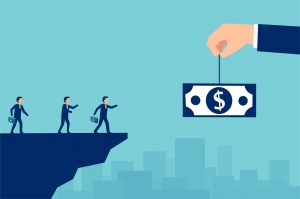
Lottery scams are one of the most common types of scams. However, these scams are the most tempting also. When people receive an email with a subject like “Congratulations, you have become a Millionaire”,it could tempt a person to try his luck. Unfortunately, he gets nothing except getting ridicule by cyber thugs. Once you fall for the scam, it becomes extremely difficult to get your way out of their trap. Now, the question arises that how do these lottery scams work?
The cyber criminals do not target a particular person. They get hundreds of email IDs from internet and send the scam email in bulk. Then they sit behind and wait for their prey to fall in their trap. When a person replies to the email, they act as highly qualified professionals who hold a major position in the hierarchy of a reputed company. They coax their victim to provide his personal information and may insist to submit a sum of money to start the procedure for sending the prize money. They may ask for a direct fee or ask their victim to open a bank account in a bank which actually does not really exist. They convince their victim to visit the fake website of the bank. The fake bank asks the person to make some initial deposit in order to open a bank account. If a person initiates the payment, they keep asking for further payments in the name of expenses until their prey realizes that he has just been fooled by some devilish geniuses.
The scammers may mention the names of multinational companies and even claim to be government officials. If their victim asks them for their identity, they do not hesitate to provide a scanned copy of an identity card of a government official. These criminals are extremely organized –they plan all their steps and work accordingly. The innocent victim usually has no idea of what they are up to, until it’s too late.
What’s more, these e-crooks actively seek out lost USB flash drives, hoping they may find some sensitive information stored within those drives. Therefore, it’s recommended that you password protect USB drives.
As the gang who are setting such plots are professional criminals, so they can be violent. It is advisable not to respond to the emails just for fun. It may become a threat to you, your family and your assets. If you get any such email, my humble advice is report it the relevant authorities.
How Can You Tell A Lottery Scam?

Lottery scams can be identified by several red flags. These include requests for personal information, requests for payment upfront, promises of large sums of money, requests for bank account information, and requests for money to cover taxes or fees. It is important to remember that legitimate lotteries do not require upfront payments or personal information in order to participate. If you are ever contacted by someone claiming to be from a lottery, do not provide any personal information or money and contact the authorities.
Lottery Winners On Instagram Real/Fake
No, lottery winners on Instagram are not necessarily real. It is important to be aware that there are many scams on Instagram that use fake accounts to impersonate real lottery winners.
Does The Lottery Phone You If You Win?
No, the lottery does not typically call you if you win. Most lotteries will notify winners through mail, email, or an announcement on their website or social media pages. If you are contacted by someone claiming to be from a lottery, do not provide any personal information or money and contact the authorities.
Winner Of 2 Billion Dollar Powerball
The $2 billion Powerball jackpot was won by three ticket holders in January 2016. The winning tickets were sold in California, Florida, and Tennessee.
Most Winning Lottery States
There is no single state that wins the most lottery tickets. Each state has different lottery games and different odds of winning, so it is impossible to identify a single state that wins the most lottery tickets. However, some states tend to have higher lottery sales than others, such as California, Florida, and New York.
Do Most Powerball Winners Pick Their Own Numbers?
No, most Powerball winners use Quick Pick, which randomly generates the numbers for them. Quick Pick is the most popular way to play the Powerball game. According to the Powerball website, over 75% of all Powerball winners used Quick Pick.
Journey Of Lottery Scamming
Lottery scamming has been around since the early 1990s, when con artists began using the telephone to call unsuspecting victims and offer them a chance to win a large sum of money if they would send a fee to cover taxes or processing costs. The scam has become more sophisticated over the years, with scammers using emails and social media to target victims.
Is there a Powerball winner giving away money?
No, there is no Powerball winner giving away money. However, there are many charitable organizations and individuals who run lotteries and raffles to raise money for causes they support. If you are looking for a way to give back, consider donating to a charity or volunteering your time to a cause you believe in.
What States Keep Lottery Winners Secret?
Currently, Delaware, Kansas, Maryland, North Dakota, Ohio, and South Carolina are the only states that allow lottery winners to remain anonymous. In these states, the lottery winner’s name, city, and the amount of the prize won are kept confidential.
Can You Hide That You Won The Lottery?
No, it is not possible to hide the fact that you won the lottery. Lottery winnings are considered taxable income, and the Internal Revenue Service (IRS) requires lottery winners to report their winnings on their taxes. Additionally, some state lotteries require winners to make a public announcement of their winnings.
First Thing You Should Do If You Win The Lottery
The first thing you should do if you win the lottery is to sign the back of your ticket. You should also contact the lottery commission or lottery retailer to claim your prize. It is also important to get legal advice and financial advice from an experienced professional to ensure that you are making the best decisions with your winnings.
How Soon Do You Get The Money After Winning The Lottery?
The amount of time it takes to receive your lottery winnings depends on the lottery commission and the state in which you purchased the ticket. Generally, it can take anywhere from a few days to several weeks for your winnings to be processed and released to you. It is important to contact the lottery commission to find out the exact timeline for when you can expect to receive your winnings.
Do You Get A Special Email If You Win The Lottery?
No, you do not receive a special email if you win the lottery. The lottery commission will typically contact you directly via mail or phone to let you know that you have won. You can also check your lottery ticket to see if you have won, and if so, contact the lottery commission to claim your prize.
Us States Allowing Lottery Winners To Remain Anonymous
The following US states allow lottery winners to remain anonymous: Delaware, Kansas, Maryland, North Dakota, Ohio, South Carolina, and Texas. In these states, the lottery commission must keep the winner’s identity confidential. However, the winner may choose to publicly reveal their identity if they wish.
Which States Ban Lottery First?
The following US states have banned lotteries: Alabama, Alaska, Hawaii, Mississippi, Nevada, and Utah.
Who Hacked The Lottery?
There is no single individual or group that can be identified as the hacker of the lottery. Lottery systems are complex and vulnerable to attack from multiple sources, including hackers, scammers, and other malicious actors. In some cases, the lottery system may be hacked by an individual or group of individuals, but in many cases the cause of the hack is unknown.
How Does Scamming Work?
Scamming is a form of fraud in which someone tries to convince you to give them money or other goods or services by making false or misleading statements. Common types of scams include phishing, pyramid schemes, and fake lotteries. Scammers may use a variety of methods to try to get you to part with your money, such as making phone calls, sending emails, or posting fraudulent ads on websites. They may also ask for personal information such as bank account numbers or Social Security numbers.
